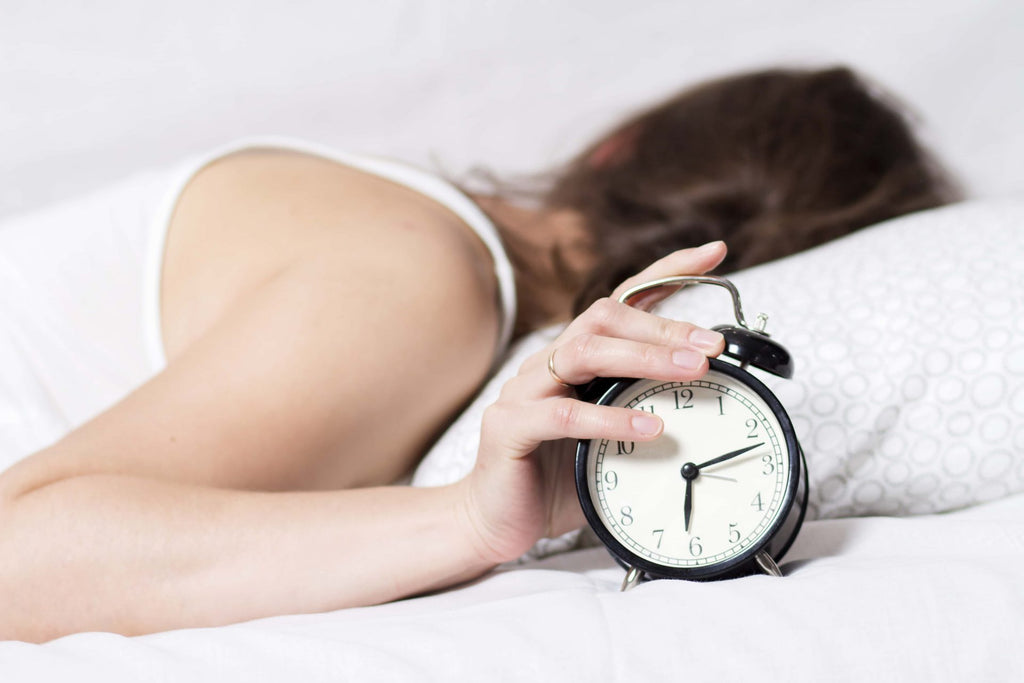How Does Melatonin Help Sleep?

We all need to rest, and a lack of sleep can negatively impact your life in many ways.
For some, it may cause bags under the eyes and a grumpy temperament. Others will have trouble focusing throughout the day, so they hype themselves up on caffeine and fight the jitters during the inevitable crash. Whatever the case may be, you need your sleep! Melatonin may help. But just how does melatonin help sleep?
What is Melatonin?
Melatonin is an endogenous hormone. When you buy melatonin, you are purchasing a supplement that mimics the hormone our body creates on its own. This is ideal for those with sleeping issues because melatonin helps with the timing of your circadian rhythm.
How Does Our Body Produce Melatonin?

It’s amazing how self-sufficient and complex the human body is. Sleep is a necessity and our body has evolved to make sure we get it via our pineal gland. This influential part of our body that sits far back in our skulls has a unique relationship with the sun that keeps us going all day long.
Our sleep-wake cycle, just like Earth, revolves around the sun. You may have noticed that waking up is a gradual process. Around the same time every day, you ease out of a dream. When the sun rises, the light inside shines in through your window and penetrates through your eyelids. A study with blind rats found that lightness increases serotonin levels in the pineal gland. Serotonin is a neurotransmitter that gives us energy and makes us feel happy.
So, after a good night’s rest, your pineal gland provides you with serotonin to make you attentive and perhaps a little excited for the day ahead. That will train your mind to be more cognizant of how much rest you get, increasing your chances of getting adequate sleep. In other words, this little boost of serotonin is like rewarding your dog with a treat for performing a trick so eventually they’ll do it on command.
You may have guessed, as the sun goes down so do your serotonin levels. That’s when your pineal gland secretes melatonin.
How is Melatonin Made?
Research suggests, “Endogenous melatonin release ﴾melatonin made by our bodies﴿ is increased each day in response to darkness, peaking between 11 p.m. and 3 a.m. at roughly 200 picograms ﴾pg﴿ per mL.” In order for this to happen, your body needs a few things to fall into place.
Your body uses the amino acid tryptophan as a catalyst for secreting melatonin. Yes, that’s the same tryptophan that makes us sleepy on Thanksgiving.The system converts tryptophan into 5-HTP (5-hydroxytryptophan). Depending on the time of day, 5-HTP will convert to either serotonin or melatonin. Studies suggest that we produce less melatonin in the long days of summer. Meanwhile, we feel a bit more tired during short winter days. Nevertheless, the changing seasons are not the only factors that disrupt our melatonin production.
What Throws Off Melatonin Levels?

Why do approximately 70 million people have a sleep disorder if our bodies produce melatonin? There are a lot of factors that are disrupting our melatonin levels, and many of them are things that we do in everyday life without a second thought.
Smart Device Usage
Our smart devices are one of the largest disruptors of our sleep-wake cycle. From our televisions to iPhones, every screen we look at has blue LED lights. Although these lights are less harsh on eyes that are staring at screens all day, they’re faking out the pineal gland.
Blue LED lights mimic the rays the sun emits when it first rises in your neighborhood. By staring at a blue-light screen, your pineal gland believes the sun is out, even if it’s 11 p.m. Turn off the gadgets so your pineal gland gets the memo. That way, it can start producing melatonin and you can get some quality rest.
Stress

Stress is perhaps the largest culprit of stress. Anytime we are under pressure, manageable or catastrophic, our body produces cortisol. Like melatonin, cortisol is a hormone.
When cortisol hits the bloodstream, our body goes into fight-or-flight mode. Your system knows the situation is severe and that you need to make a swift decision with little room for error.
That moment may cause a boost of adrenaline to power you through victoriously. On the other side, cortisol can also make your mind lock up in fear. In turn, you produce more cortisol and hide from the situation in front of you.
Cortisol is meant to be a fleeting hormone. However, in our fast-paced lifestyles, many factors can cause stress:
- Long commute to work
- Mean boss
- Money problems
- Never-ending bills
- Poor personal health
- Rocky relationship
- School
- Stagnant career
- Work-life balance
All of these are situations that require cortisol production, and dwelling on them is like opening the levee for a cortisol flood. As more cortisol enters your system, it continues to let your body know that you’re stressed. As a result, you don’t produce other hormones, including melatonin.
How Does Taking Melatonin Help You Get Sleep?

Melatonin supplements are formulated to mimic the naturally occurring hormone in your system. When your endogenous system is under the rule of cortisol, sometimes it needs a little extra support.
Supplements containing melatonin help replenish a crucial hormone in your system that your body is sorely lacking. Naturally, the extra melatonin will make you feel groggy. As you sleep, your cortisol levels will deplete and you will be on your way to a good night of rest.
Thanks for reading! To show how much we appreciate you, we’re going to give you 16% off your next order. Just use code READER16 at checkout!

Newsletter signup
Join the Joy Organics Family
Sign up and get updates on new products, as well as special coupons and discounts.
testimonials
What Our Clients Say
“This is a company that truly cares about its customers and providing the best CBD products currently available on the market.”










Join In On The Conversation
Your email address will not be published. Required fields are marked *
Comments will be approved before showing up.